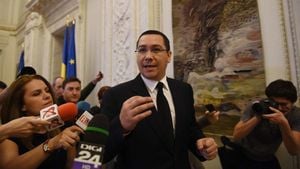The Belagavi border dispute has ignited fresh tensions between Karnataka and Maharashtra, with political leaders on both sides making headlines as protests and controversial statements heat up the situation. The growing conflict, centering on the district of Belagavi, is driven by historical claims and cultural sentiments, with residents and politicians voicing strong opinions on the matter.
Recent protests by the Shiv Sena (UBT) have brought new attention to the issue, particularly following remarks by Karnataka Chief Minister Siddaramaiah. During a media briefing, Siddaramaiah dismissed the call from Aaditya Thackeray, scion of the influential Thackeray family, to declare Belagavi as a Union Territory, labeling the demand as "childish." His comments reflect the Karnataka government's firm stance against any territorial claims made by Maharashtra.
Thackeray's demand followed the Karnataka state government's denial of permission for the "Marathi Ekikaran Samiti" (MES) to hold its conference within Belagavi. This decision has been met with outrage from Marathi political circles, as Thackeray accused the Karnataka administration of denying justice to Marathi-speaking individuals living in the area. He expressed this dissatisfaction via social media, emphasizing the need for “justice for the Marathi people,” particularly as tensions were exacerbated by imposed restrictions and heightened law enforcement presence.
During the latest confrontation, Chief Minister Siddaramaiah reiterated the Karnataka government's position. He referred to the Mahajan Commission report, which concluded the boundary dispute by affirming Belagavi’s place as part of Karnataka, as "the final word on the matter." He stated, "It's folly to demand inclusion of the district with Maharashtra. The Karnataka government will not tolerate childish statements being made on this regard." This assertiveness has sparked criticism from various Maharashtra leaders who allege their state's rights are being ignored.
Maharashtra's Deputy Chief Minister Eknath Shinde also weighed in on the controversy, condemning Karnataka's actions as oppressive and lamenting the arrests made during protests. He vocally defended Marathi interests, saying "Marathi-speaking people have the right to organize events freely without state interference. The Karnataka government unleashed repression by arresting key leaders and citizens supporting the Ekikaran initiative." Shinde's comments underline the underlying socio-political tensions, with claims of significant cultural and linguistic marginalization surfacing from both sides.
The backdrop of these political upheavals is rooted not just in dispute over spatial claims but entrenched identity politics, stretching back decades. Belagavi, which has large Marathi-speaking populations, was historically under the jurisdiction of the Bombay Presidency and its inclusion within Karnataka has been contentious since the reorganization of states based on linguistic lines.
With protests led by the MES and strong feelings from residents on both sides, public resentment is palpable. Activists from both sides have organized rallies which at times have turned confrontational. On one occasion, as MES members rallied to voice their demand for the status of Belagavi to be changed, clashes erupted, raising concerns over public safety and local political stability. Karnataka’s government has been criticized for the heavy police response to these protests, with numerous arrests made as authorities tried to maintain order.
The response from political leaders extends beyond mere words. There are calls for unity among Marathi speakers, echoed by multiple leaders from various parties, urging collective action to assert their rights. The controversy serves as bait for political mobilization as the elections loom near, with parties on both sides leveraging the sentiments of their respective electorates.
Community leader and activist, speaking on behalf of the MES, articulated the frustrations of Marathi individuals, stating, "We feel suffocated under the Karnataka government's unjust policies. Our rights as Marathi speakers are being undermined and ignored, and we will fight for recognition regardless of what the administration says!" This sentiment resonates among community members who harbor fears of cultural assimilation.
Even as tempers flare among local leaders and activists, the discourse surrounding the Belagavi dispute reveals significant socio-cultural divides intersecting with regional pride and identity. For many, the status of Belagavi is about more than administrative boundaries; it encapsulates historical grievances and aspirations for equitable recognition.
Simultaneously, political strategists point out how the controversy potentially offers electoral leverage as emotions soar. Upcoming state elections are firmly on everyone’s minds, providing fertile ground for parties to explore rhetoric surrounding cultural and linguistic autonomy. The decisions made now may significantly impact political alliances and voter sentiment leading right up to the polls.
All eyes are on future developments as officials from both states convene to discuss resolutions and pathways forward, yet the inflamed sentiments suggest discussions will not be easy. Local residents, political figures, and activists remain vigilant, prepared to mobilize as expressions of identity and belonging grow louder across borders.
Both Karnataka’s and Maharashtra’s governments may have to grapple with not just their administrative prerogatives, but also the deep-seated emotions running through communities affected by these territorial discussions. With protests showing no sign of dwindling, it’s clear the Belagavi border dispute is more than just a political circus; it's a complex interplay of identity, culture, and regional pride.
Future dialogues may yield innovative solutions or escalate tensions even more. For now, the stage is set for all parties involved to navigate these murky waters with sensitivity and foresight.



